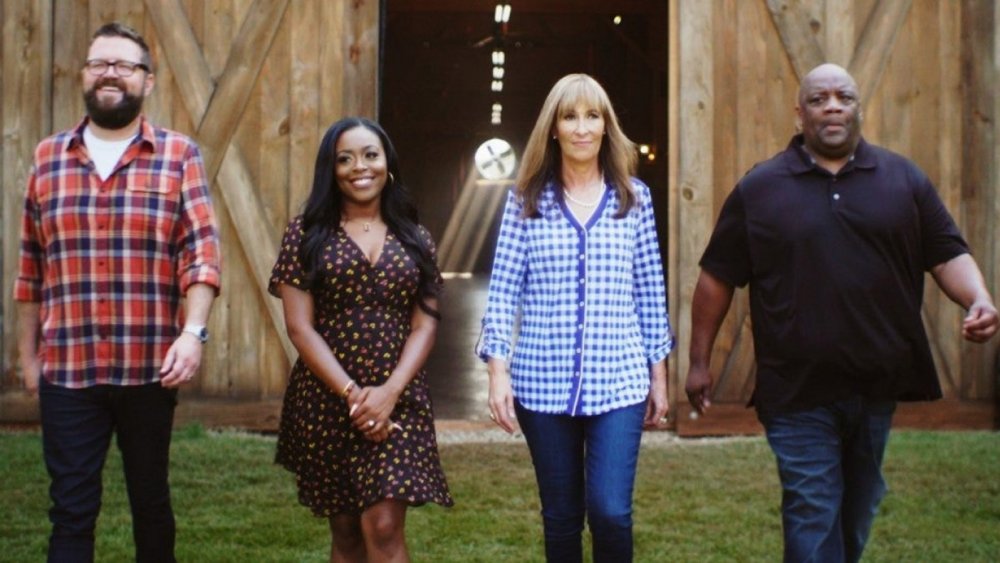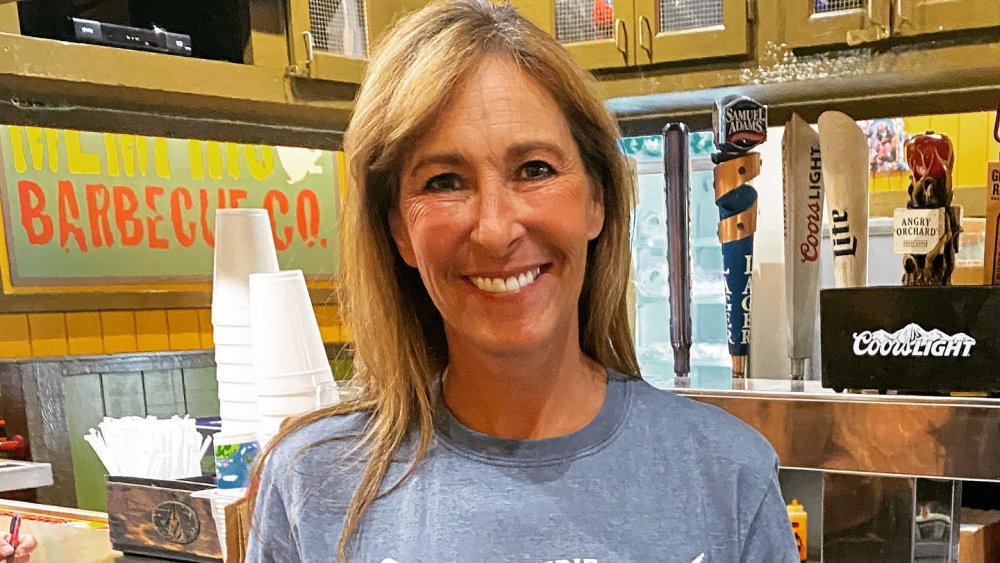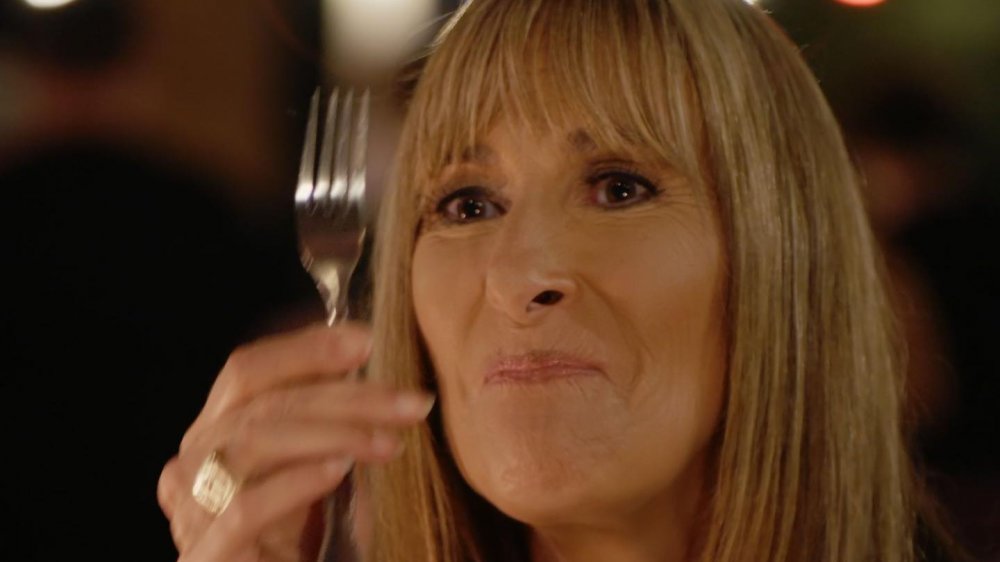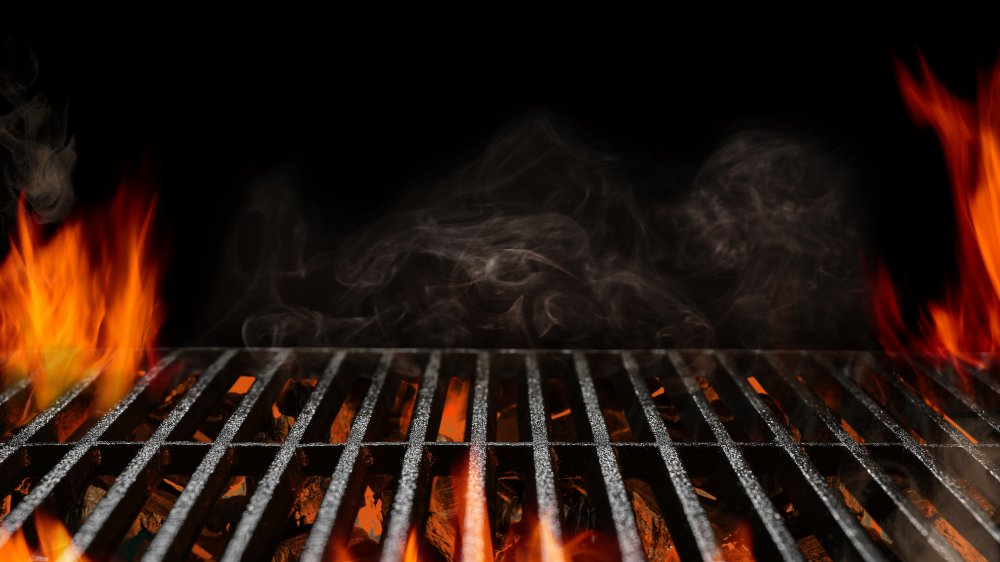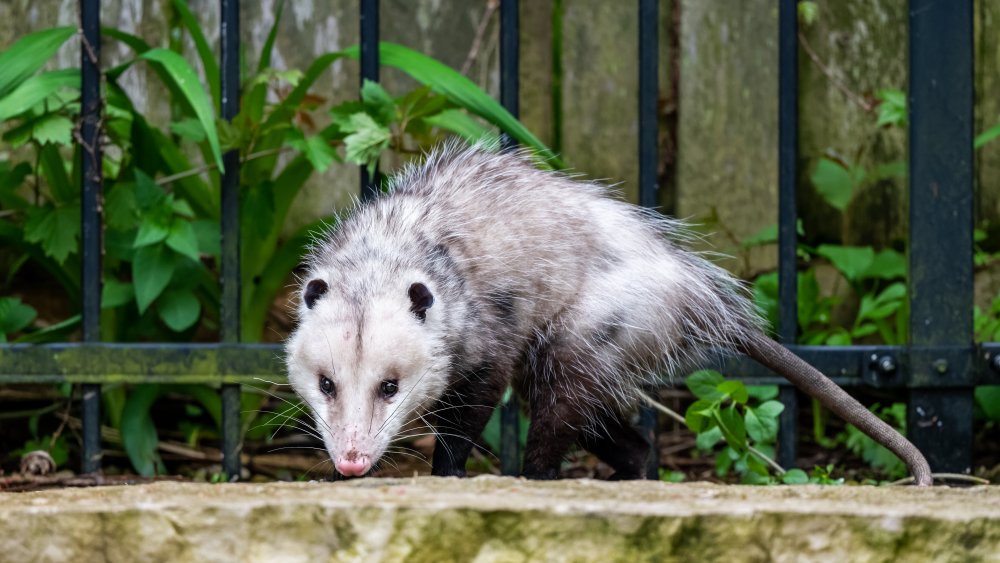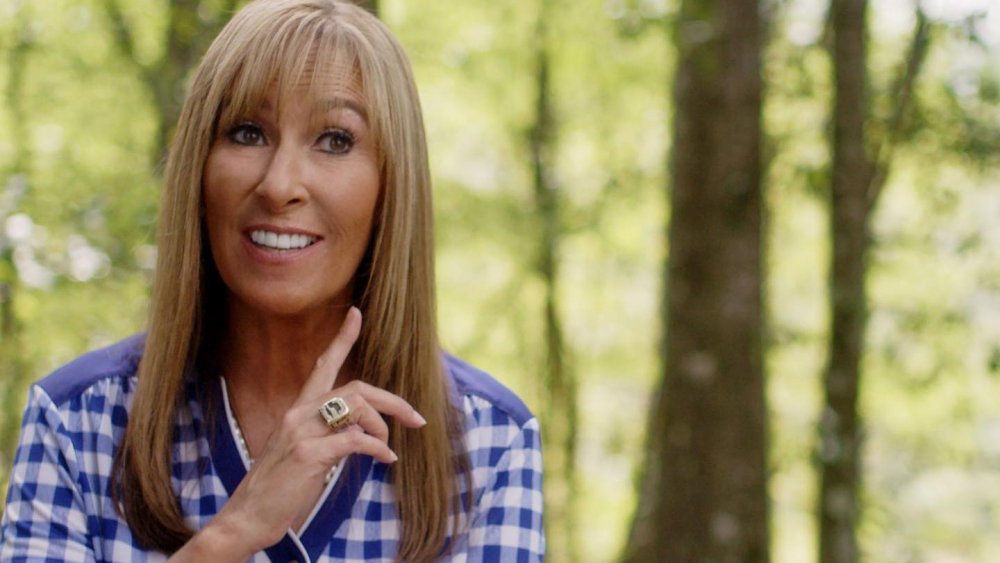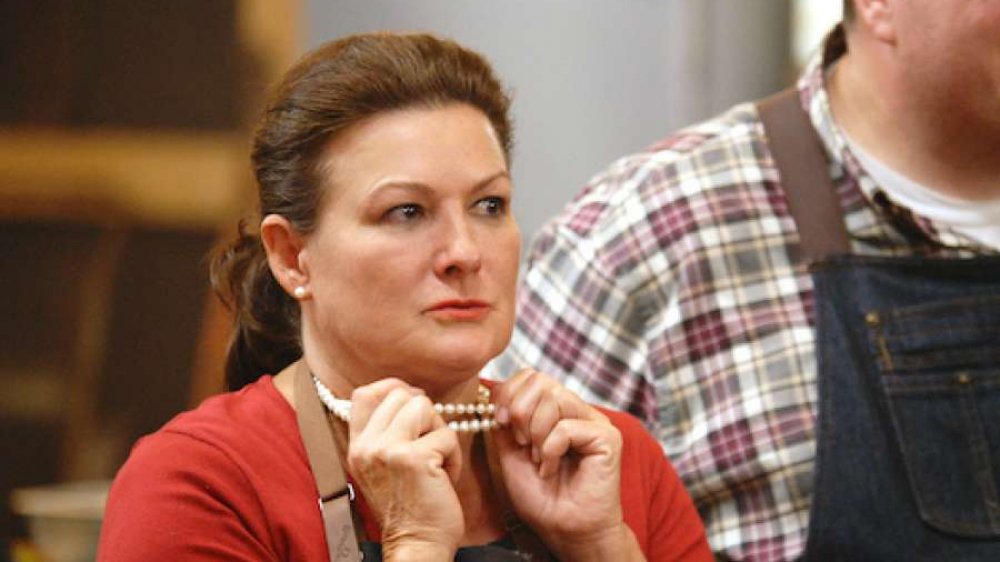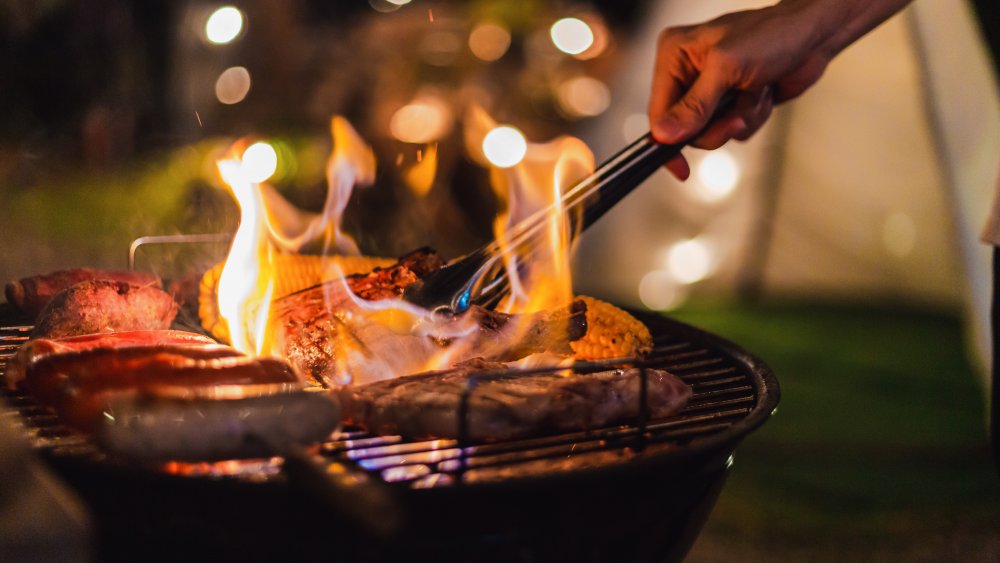American Barbecue Showdown Judge Melissa Cookston Dishes On All Things BBQ - Exclusive Interview
We may receive a commission on purchases made from links.
Mississippi-born Melissa Cookston is a lady who knows her 'cue. This seven-time world barbecue champion is the owner of the restaurant Memphis BBQ Company and the author of two cookbooks, Smokin in the Boy's Room and Smokin' Hot in the South. If you're a cooking contest show addict, you might know about Cookston's picky palate from her stint judging BBQ Pitmasters. Well, Cookston is back, and this time, she is judging the new cooking competition, American Barbecue Showdown, alongside fellow BBQ legend Kevin Bludso. In the 8-episode pilot, Cookston serves up her trademark tough love when it comes to under-salted pork and too much smoke, but also gives backyard chefs the advice they need to go head-to-head with their more experienced professional cookout competitors.
In an exclusive interview with Mashed, Cookston shared what it's really like to judge American Barbecue Showdown and other cooking competitions, her favorite moments from the new Netflix series — and what it's like to be the woman who beats all the men at the barbecue game.
Melissa Cookston on what it's really like to judge a cooking competition
What is the most difficult thing about judging a cooking competition?
Well, I come naturally from a competitor's point of view. So, as a competitor at heart, you want to make sure that you get it right. I want to give my undivided attention to the competitors and make sure that I have an open mind when it comes to judging every facet of the food, and make sure that I'm giving them my all when it comes to judging.
When you are judging a dish, what are you judging? Is it flavor? Is it plating?
I would say plating is at the very bottom. For me, flavor would probably rank as number one. That would probably be my highest multiplier. Then closely thereafter, texture. Texture's very important when you're judging food. I'm a texture eater, so texture's very important for me. The aesthetics for me are not nearly as important, but it has to come into play, especially if it's a tight race. But that would be the only time it would come into play. And it can be a hot mess. As long as it tastes good, and it's got a great texture, I'm in.
How was judging the American Barbecue Showdown different from judging BBQ Pitmasters?
Well, BBQ Pitmasters was a lot of the same meats that we cook at barbecue competitions. American Barbecue Showdown was not the same meats. And you got to realize, yeah, as a competitor, we spend years honing our skills — cooking those same meats that we cook in competition. So, we're pretty good at those.
But when you throw in challenges and you throw in all these different sides and challenges in the middle of challenges, that's where it really kind of sets apart what you're made of. What can we put upon you that you may not be able to handle?
And really being able to see what you can do with those adversities, seeing how you handle that, really shows me what your skill level is as a barbecuer. So, it was really intense a lot of the time in American Barbecue Showdown.
I will say that the executive producer, Daniel Calin, is brilliant. Whereas a lot of producers that I've worked with before may have stopped, he let the show breathe. In other words, he let things play out. So, we got a lot of moments in this show [which] we didn't get in shows before because he let the extension happen. He waited to see what followed. So with this show, you get some pretty personal reactions to things. And that happens in real-life competition.
Do you feel like The American Barbecue Showdown is a good snapshot of what it is like to be in an actual competition?
Somewhat, somewhat. We've all had in competition those moments where things did not go as smoothly as we had hoped. We call those "opportunities." We have opportunities here, and you'll find in this show that just because you had a massive explosion doesn't mean that you can't come back from it. So, don't panic. I've had those happen. I mean, things did not go the way that I foresaw or some things you can't help. Mother Nature rolls through a tornado, and all of a sudden, I'm not at the temperature I need to be. But you have to, as a professional, know how to overcome that.
How is American Barbecue Showdown different from other popular cooking shows, like Iron Chef or Top Chef?
The competitors come from all walks of life. They have different skill sets. Some of them are classically-trained chefs. Some of them are caterers. Some of them are just the heroes of their backyard. And I think you will be surprised at how the heroes in their backyard fare against the classically trained chefs. We, as judges, have a very open mind when we're judging. We are not judging classically competition barbecue rules. We had a lot of fun. A lot of tense moments.
So, we really take a personal approach to this show. We are all family by the time this show is over. Well, actually, it took us about 45 minutes into the show to become a family. But by the end, we're really tight. So, there's just so many different people coming from so many different backgrounds that this isn't going to be a show like any other that you've watched. And I guarantee you, you're going to find a personal connection to somebody on this show.
What it was really like to be a judge on American Barbecue Showdown
It seemed like you and your co-judge Kevin Bludso seemed to agree on a lot of things. Were there any disagreements about who should win behind the scenes?
Not really. I think we did a good job of reasoning through things, talking through things. We had different points of view sometimes, but once we got through talking it out, we agreed. We certainly didn't have any big disagreements... we just sat down and reasoned it out and had pros and cons. And usually, it all just made sense. It all fell in place.
Were there any disasters that happened during the taping of American Barbecue Showdown that happened behind the scenes, or that didn't make the cut?
Well, I haven't seen all eight episodes yet, so I can't really comment to that. There were a lot of moments, and there were a lot of special moments. I think there were a lot of people with a really great sense of humor on this show. I know certainly the host and the judges, we had a really good time. But there were a lot of special moments on the show, more so I think than any other show I've ever done. I know Georgia had one. Ashley had one. Tina had one. Sylvie had one. There were just a lot of special moments in this show.
Which challenge would you have wanted to do the most, if you'd been a competitor instead of a judge?
The whole hog was one that I would have wanted to cook. Oh, yeah. Oh, yeah. Give me that anytime because that's kind of what I'm known for. That's what I do. So, I wanted to cook the whole hog with them. Of course, they wouldn't let me, but that would have been awesome.
Did you have to hold yourself back from giving advice?
No, no, no. Well, maybe. Well, maybe. Because you wanted them to succeed. Each and every challenge, you wanted everybody to succeed, everybody. So, if there's something, it's like, "I wish I could tell them," especially if they've never done it before. So yeah, maybe a little.
Melissa Cookson on mistakes she's made in her own barbecue competitions
Did you ever have a big failure when you were competing?
Usually, those were due to Mother Nature. I've completed in the middle of some really bad weather, so I don't really recall anything. I do recall one contest where the ribs kind of got forgotten — put on the smoker. So, I ended up cooking a two-hour rib. I do remember that.
So, the ribs were really too hot for me to handle to give the judges at the table because we did onsite presentation at that point. So, I talked a lot during my 15 minutes, and I just kind of slapped the ribs on the plate at the end. And I ended up winning grand with those ribs — so [it] wasn't necessarily a bad thing. You can come back. You can come back. That's the moral of the story. Don't ever give up.
What it's like to cook and eat raccoon, possum, alligators, and other game meat
Did you feel squeamish about eating anything on the show? Were you comfortable eating the squirrel, raccoon and other animals in the game meat episode?
I don't know if "comfortable" is the right word. I'm from Mississippi. So, I mean, there's not really a lot we don't do down here. But as a judge, that's what you sign up for. And in order to give everybody a fair shot to win that show, that's what you have to do. Really, as a restaurateur, the only thing that I really ever worry about, if something wasn't safe to eat. Because as far as eating possum or beaver or raccoon or iguana, I mean, that's what I signed up for. I knew that, so nah.
Had you ever eaten these meats before, or were any of them new to you?
Some were new to me. In one episode, there were several eaten at one time, so I kind of felt like they might be having a little disagreement there at one point. But yeah, I toughed it out. And I ate more than one bite of everything to give the contestant a fair shake. I went for it. I was a team player. I was a team player.
How would you have felt about cooking game, if you'd been a competitor?
Well, I mean, I wouldn't have wanted to cook all those, all the beavers and the skunks. I don't think we did skunk. But the possums and — the whatever we cooked — I wouldn't have wanted to do that. I mean, when you're faced with something like that, you just treat it like something you know. I know how to pull gaminess out of wild game. And I know how to cook something about this size. So, we all know how to treat things like that.
I can remember one time in a competition, I was driving out to L.A. to do this competition. And I was making fun because we pulled over at a roadside stop, and it said, "Beware, rattlesnakes." And I took a picture of it, and I said, "Anybody got a recipe for rattlesnake?" I'd be danged if that wasn't one of the things they gave me to cook. And I was like, "I should have looked to see if anybody actually posted a recipe, but I did not."
How did it turn out?
Well, I did pretty well. I did pretty well. That was one of the ones where you get eliminated, and they thought my rattlesnake was pretty dang good, so I didn't get eliminated. So really, it's kind of psychological warfare when you're given these things that you have no idea how to cook.
How Melissa Cookston prepares to judge a food competition
How do you eat before you judge a competition? Do you skip food beforehand?
I don't eat a whole lot anyway. So, I always keep snacks in my trailer just in case I start getting hunger pangs or whatnot. And I'm kind of always the mama on set. I always bring snacks for everybody. So, I've always got something to be prepared, but I just don't eat a lot anyway.
Do you do any sort of palate-cleansing prior to judging?
Well, I mean, I've been a judge for 25 years certified, so you're kind of taught to eat crackers. But that's a little filling. I'm bigger on citrus, really, for palate cleansing. I do drink a lot of water, but I'm a big coffee drinker. So, I will tell you, the contestants, every one of them I believe, said something to me about, "Your palate is so sophisticated. How do you pick up... I didn't even mention that, but you picked up on it."
But I've been in the restaurant business for 38 years. And there's just something about tasting things so much that I can eat one thing, and it might be spicy, but even without palate-cleansing, I can pick up just simple nuances and something right behind. And it just comes from doing it so often I think.
[As a judge] I have a very sophisticated palate when it comes to barbecue, meaning I'm not a purist. I think there's more than one way to achieve great barbecue. I've been very fortunate to travel the world and taste different cultures' versions of barbecue. I love different flares, different people's takes on barbecue. So, everybody has a personal feeling about what barbecue is. And I think that competition barbecue really kind of sometimes gets in a rut about the same flavor profiles, about the same textures.
How it feels to be a role model for other female barbecue cooks
What is it like to be a female barbecue expert in a field that's seen as male-dominated?
I get asked that question a lot, and I don't really know how to respond because you have to understand, I've been cooking on the circuit 25 years. And when I started out, I didn't really realize that I was the only woman out there. I just went and did it. I wasn't really ever treated any differently. I think I was just always kind of respected because they saw me pulling my own rig. They saw me back in the trailer. They saw me juggling the hog, and my husband was always there with me. So, I think it kind of took people a while to realize, "Hey, the chick's doing all the work over here."
So, I really just didn't have the issue with it. I think that the media has made it out to be [an issue]. They say "the winningest woman in barbecue," and I'm like, 'Well, it's not like there's ladies teas in barbecue." So, I won those world titles against a bunch of men. I think I don't really have as big a deal with it as maybe some other people do.
Outside of the industry, have you ever had your profession questioned? Has anyone asked, "Why don't you bake cookies or apple pies?"
They know I'm mean. They wouldn't say that to me. I will tell you though, it's really special to me when these young girls come up to me and they say, "Oh, I want to be like you." Now, that touches my heart because I have a daughter, and she's 22 now. And she used to go on the road with me some back when I was competing and to watch her... She's a fabulous cook now. And that warms my heart to see these young ladies that want to barbecue.
How did you feel about seeing a woman win American Barbecue Showdown?
Well, Tina [Cannon] had reminded me that I had spoken to her at a barbecue contest in Georgia, and that really kind of fueled her desire to actually get in and barbecue full time or at least compete more than she was. And that made me feel like I had done something for somebody. And any time that I can do something for somebody and make them want to compete professionally or do what I do, it humbles me. It's not easy. It's not easy to compete professionally.
I mean, you're not going to get rich competing in barbecue, and it's very hard to make a name for yourself. I got really lucky at some big competitions at the right time. So, it's hard. So if a few words of encouragement for me helped her, that was a pretty big moment for me. And to see her win is, yeah, it kind of melts me a little, makes me a little ooey-gooey, and I'm not that kind of girl.
How did you feel about Rasheed Phillips, who was also a finalist?
He's awesome. I wanted to adopt him. I kept telling him, don't you see the family resemblance? I mean, you can come work with me. I mean... He brought some flavors to that competition that made my palate sing. I mean, he really... Yeah. Yeah, he did. He made me happy.
Melissa Cookston on how we can all enjoy the best barbecue of our lives
Is there one trick you think every barbecue cook should know?
Well, there's one piece of advice, everybody wants to oversmoke. They think you should pour the smoke to it. Smoke should be treated just like any other ingredient. Just like you wouldn't oversalt something, don't oversmoke something. You should still be able to taste the meat that you're cooking, the pork, the beef. So nuances, baby, nuances. A kiss, give it a kiss.
What do you think is the best barbecue restaurant in the country in the United States?
Mine. Memphis Barbecue Company.
When you step into a barbecue restaurant, are there any dead giveaways that you're either about to enjoy great 'cue, or that you should walk right out the door?
Well, like I said, I'm not a purist. Most people would say if there's not any wood anywhere visible that it's not real barbecue. I kind of disagree with that. I've had barbecue in places that I didn't see wood, and it was pretty dang good. I think everything is relative.
I think there are so many different types and styles of barbecue. Some can't be compared. Some may be equally as good. You have so many different regions of barbecue, and they're so different. And I love different things about all of them, and I love them all. I mean, it's like you just want to bring them all in and give them a hug. So, I don't believe in somebody saying, "If you don't do it this way, then it's not the right way."
So, and even when you talk about Korean barbecue versus American style barbecue, or people say, "Well, if you're just grilling, you're not barbecuing." Well, if that's the way your mama does it and that's what she calls barbecue, who am I to tell you that's not great? So, I'm not one of those professional barbecuers that's going to lead you down a path of this and this and this is right and this and this is perfect. I'm a little more open-minded than that.
